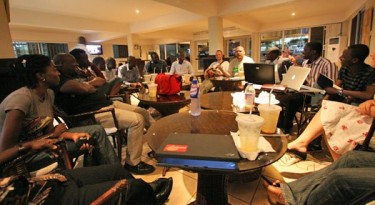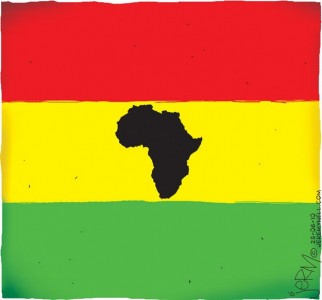On April 8, 2011, Ghanaians came across a very demeaning and disgraceful article titled “Inside the criminal world of Ghana's e-mail scam gangs” by Thomas Morton, which got featured on the CNN website. Ghanaian bloggers consider the journalist to be completely uninformed and biased. After reading the article, Maame Serwaa Adu (@SekondiGal) tweeted:
a classic example of irresponsible journalism
Bloggers from Ghanablogging.com discussed this very article amongst themselves where they expressed various opinions and pointed out the weaknesses of the article.
One could tell from Graham Knight‘s opening paragraph in his post that he was not happy with the “facts” from the article:
Distortions, exaggerations and untruths come easy when reporting Africa because they build upon a set of common themes in which certain stereotypes are taken for granted. Attitudes to poverty, corruption, crime, etc. provide a foundation on which other narratives are built. These narratives are dominated by a viewpoint from those outside Africa.
He also went on to stress on the various lies been peddled by the article below:
The fabrications about the environment in Accra, begs the question whether the writer has actually seen for himself or heard second hand.
- Writing that the President’s “Palace” is surrounded by dirt-roads is a lie.
- His addition that the “Presidential palace” apparently “gold-columned” is perhaps a code for “rich, fat, corrupt African dictator lives here”.
- A statement suggesting that 99% of Ghanaians sell ‘pure water’ on the roadside whilst the other 1% languish in luxury in bars with a $50 entrance fee, is an exaggeration that is laughable and inaccurate.
The accusation that ‘most’ Ghanaians have to use crime to buy a nice car betrays the obvious reality of Ghanaian life.
Nana yaw Sarpong, who blogs at Ready to Chew, titled his article: “Another Fool Writes on Ghana–Bad Reportage Akwaaba.” He says:
I have a job. Many Ghanaians own 3 bedroom houses. Buy their cars with their incomes not loans. There are good roads, Skyscrapers, Banks, 5 Star Hotels and Slums. But water sachet sellers do not even make up a percent of the population. I dare say only an ignoramus who sat in his car the whole time in Ghana would cough up such write-ups.
Here comes a big disappointment:
This article should be treated with the disdain that it deserves; highly disappointed in the idiot who wrote it. Has he taken a good look at where he is coming [from]? There is crime, unemployment and the likes. The idiot who wrote it should seek to correct all that before trying to correct ours. We do have some developmental problems but not as he/she has put out there.
I couldn’t beg to disagree with Edward Tagoe’s article which actually responded to all Thomas Morton's lies. He observes:
Anyone who has stayed in Ghana long enough will realize majority of Ghanaians and the authorities governing them are disgusted with the Sakawa problem just as much as any foreigner is. Sakawa is an off-shoot of what started as ‘advance-fee fraud‘ or 419. This phenomenon has gradually grown into a lucrative engagement for some young people in Ghana. Advance fee fraud or 419 is reported to have originated from Nigeria and is gradually creeping into other parts of of the West African region.
His reaction/response to one of the blunder or “fact” is below:
Unemployment rate as we all may know is technical figure that represents not the number of people who are without jobs but rather the number of individuals who have been without job for a particular period of time, and have made or are making a conscious effort to find jobs within that period. For me therefore it is no wonder that governments everywhere in the world hide behind this definition to produce numbers that paint brighter pictures of their economy. If Ghana is a culprit then all countries round the world are too.
Blunder 2: The Ghanaian government likes to boast that their unemployment rate is in the single digits ….The actual unemployment rate for 15- to 24-year-olds hovers between 25 and 30 percent
I was happy when I woke up this morning to see a Letter to CNN titled: “CNN Gets Ghana Wrong” written by Kobina Graham.
Kobina Graham, is the editor of the quarterly Dust Magazine, which is produced for and about the people of Accra. He couldn't help but join the band-wagon of bloggers in reacting to the demeaning and false-peddling article about Ghana. Instead of attacking the article just like others did, Kobina decided to choose some quotes, pick them apart and show what his problems were with them.
Quote: “Filed under: Web”
This in fact was my first problem with the piece. I would have filed it under ‘Vaguely Creative Non-Fiction’. Or under ‘Well-Intentioned But Undercooked Journalism’.
Quote: “Ghana is doing extremely well by African standards. Of course “by African standards” means there are dirt roads leading past the brand-new, gold-columned presidential palace…”
Condescending, but I won’t even go there. I drive on that road on my way to work everyday and it’s in one of the most tarred areas in Accra. Ask the French whose Embassy is – unfortunately – next door.
He also responded to the iced-water selling lie:
Quote: “… and it seems 1 percent of the country is blowing their country’s GDP at bars with $50 cover charges while the other 99 is selling bags of water at stop lights.”
Not every rich Ghanaian acquired their money through scamming the State. Note also that those wealthy Ghanaians are always outnumbered at these bars by – how do I put this delicately – white people. Yet we’re not sitting here accusing every white person in Ghana of being here to scam Ghanaians. The writer gets away with this because of the words “it seems”. If this were a court of law, I’d have yelled “objection!” and the judge would yell “sustained!”… but a picture would already have been painted in the jury’s mind.
Kobina also made a case about the “sakawa” menace in the country.
Quote: “Sakawa (which originally referred to a specific credit card scam) now means pretty much anything involving money — if you wear a bunch of flashy brand-name clothes you’re dressing “Sakawa,” if you’ve got a nice car it’s a “Sakawa” car — all of which makes sense considering internet scamming is the only way most Ghanaians can afford this.”
Actually, the accusation most often levelled at people who get rich suspiciously quickly here is that they were involved in drugs… and – although sometimes true – it isn’t always the case.
Quote: “Right now Sakawa is in its salad days. The Sakawa Boys movie franchise has made it up to “Sakawa Boys 8″…”
Hardly surprising in a film industry in which MOST films make it to part 4 at the very least.
Quote: “… and Ghanaians of all ages and interests (but mostly “young” and “not being poor”) are packed into internet cafes finding more and more ingenious ways of ripping off Westerners.”
Again with the embellishments. Are you sure we didn’t go to Mfantsipim together? I remember how my classmates used to embellish stories about having lost their virginity. I finished back in 1994. Let me know if we’re in the same year group.
Qoute: “… a few, like our guide Seva, see Sakawa for what it really is: a massive bubble just waiting to burst.”
Funnily enough, this was somewhere you could have overstated facts but didn’t. There aren’t that many computers in Ghana. Yet we are already amongst the world’s best at online scams. Very worrying, and as more of us get connected to the internet, this may increase. That said, not ALL Ghanaians are involved in internet fraud – young or old. Not even the majority. I reckon it is – at best – a significant minority. Feel free to prove me wrong.
Ghanaian bloggers find the article misleading and wonder why western journalists find nothing positive in Africa. Most of the youth in Ghana are not involved in “sakawa” nor selling sachet water (pure water).
Opportunities for the youth in the job market have never been higher in Ghana. There are many young Ghanaians who create their own businesses like Edward Amartey-Tagoe, co-founder of Nandi Mobile and Esi Cleland, co-founder of Afrochic Clothing.









10 comments
Great job, MJ. That’s an awesome summary of our reactions. I need not say more.
The story in question is a production of Vice Magazine’s Motherboard TV and not of CNN. It wouldn’t be the first time they have produced insensitive reporting on otherwise important issues. I wonder if you ever saw this? http://www.ethanzuckerman.com/blog/2010/01/25/liberia-shock-or-insight/
Nice summary, MacJordan. Good stuff!